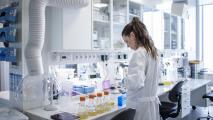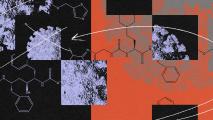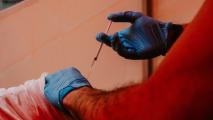The race to develop a safe and effective COVID-19 vaccine may be the biggest scientific effort of our lifetime, but even with more and more potential vaccines creeping toward clinical use, it may be a while until everyone is able to receive these critical vaccinations.
In the meantime, scientists are working to develop treatments for the disease that may help protect high-risk communities before covid vaccinations become widespread.
A new antibody-based treatment, recently presented in the journal Cell, could not only help treat symptoms in those already infected but could also potentially prevent new infections from occurring (temporarily, at least).
While this antibody therapy has currently just been demonstrated in two animal models, mice and hamsters, if it also works in humans, it could potentially be delivered just like an inhaler for asthma, rapidly coating the lungs with virus-neutralizing antibodies.
A Short-Term Solution
When it comes to treating infectious viral diseases, a vaccine is the gold standard: if you never get it, you’ll never die from it. But it’s not the only option.
For COVID-19 in particular, antibody therapies have caught the attention of scientists as a way to fight existing covid infections. These therapies differ from vaccines in a few key ways.
Vaccines work by introducing a small part of the virus to your system and training your body to create antibodies (defense proteins) to fight off the virus. Then, if you’re ever actually infected with the live virus, your body knows exactly what to do to stop it. Vaccines are generally designed to work for years but may be topped up occasionally with booster shots.
Antibody therapies, on the other hand, fight disease by injecting antibodies into your body directly, instead of waiting for your immune system to make them itself.
These antibodies can come from the blood of previous survivors or from certain animals (like horses or alpacas), or they can be cloned and manufactured in a laboratory. Antibody infusions can be useful if somebody is already sick and their immune system needs reinforcements, or they can provide short-term immunity if there is no vaccine available yet.
Because your body isn’t actually producing the antibodies, though, your system will clear them out as soon as you stop taking the treatment, so this isn’t a long-term solution, but it can provide temporary relief and protection.
Needle in an Antibody Haystack
But before the researchers could begin testing an antibody therapy, they first had to go fishing to find an antibody that would work for SARS-CoV-2, the virus that causes COVID-19.
To do this the researchers sifted through catalogs of 100 billion potential antibodies made from human blood samples and “baited” antibodies with a piece of the SARS-CoV-2 virus – its signature spike protein. In record time, they were able to zero-in on a super tiny, but effective antibody. When the smallest part of the antibody is fused together with its own tail, it formed the light-weight drug Ab8, which the researchers say has the full immune-boosting power of a regular sized antibody, without all the extra weight.
The drug was tested on a mouse that had been infected with a modified SARS-CoV-2 virus, and the researchers found that very small doses of the drug were able to decrease the amount of virus in the mouse by 90%. This worked in part because Ab8 is able to bind to the coronavirus and prevent it from attaching to cells.
They also found that preemptively administering small doses of the drug to hamsters successfully prevented infection when they were later exposed to the virus, similar to what a vaccine might do.
The scientists behind the study also noted that because Ab8 is so lightweight, it could potentially be delivered by inhaling a mist or vapor straight into the lungs (the preferred target of SARS-CoV-2). This could potentially increase its efficacy and ease of use compared to an intravenous solution, which generally has to be administered in a hospital.
This drug has now been licensed by the biotechnology company Abound Bio for worldwide development. The researchers hope to begin human testing and safety trials of the drug in 2021.
What’s Next
While the results of this study are promising, that does not mean the drug will be cheap or easy to manufacture and distribute. And this steep cost may work to limit access to these drugs in some parts of the world, especially poorer countries.
As this drug heads into human testing, we will better know how accessible a solution like this might truly be.






